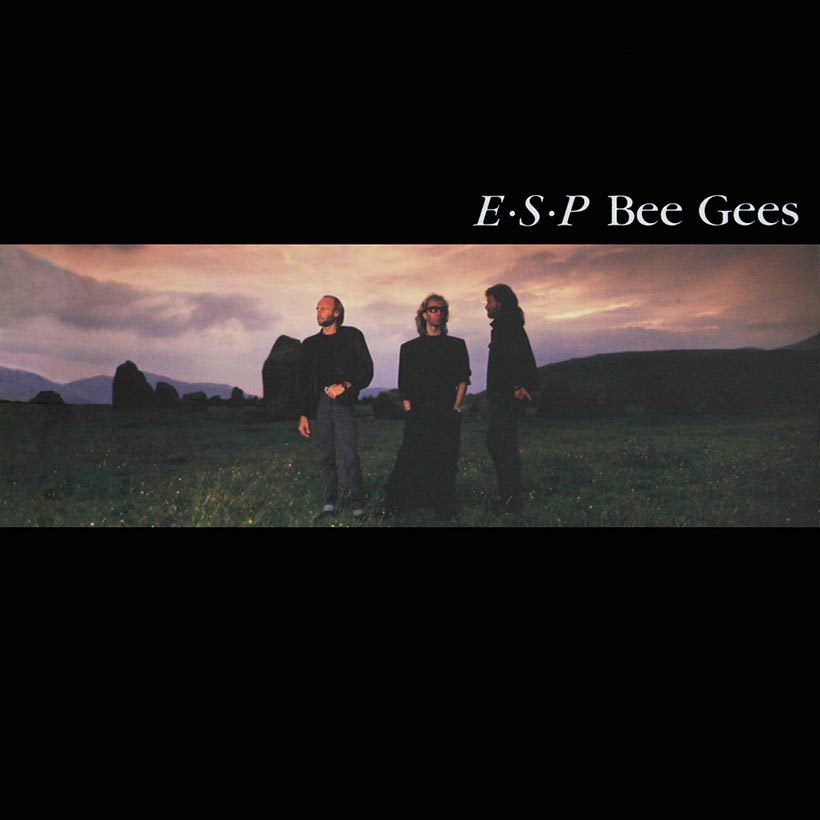‘ESP’: How The Bee Gees Took Their Hitmaking Vision Into A New Era
The album gave the group vast and renewed success across Europe, and a new UK No.1 in ‘You Win Again.’

The extensive, esteemed Bee Gees catalog contains many records that fared better in certain countries than others. Such was the case when they released their ESP album in September 1987.
Despite a relatively modest performance in America, it gave the group vast and renewed success across Europe, where its lead single, “You Win Again,” became another No.1 anthem for the Gibb siblings. ESP was the siblings’ first studio album in six years, following 1981’s Living Eyes, and it marked the resumption of their inspired studio relationship with master producer Arif Mardin.
Twelve years earlier, Mardin had overseen Main Course, the album that lit the touchpaper for the Bee Gees’ jaw-dropping achievements of the late 70s, and set them down the disco path with “Jive Talkin’.” The musical landscape of 1987 was rather different, but the post-disco fallout that had affected the Gibbs – and many other club-friendly artists – had now subsided.
The beginning of a new age
This was the beginning of another technological age, and ESP became the first Bee Gees album to be recorded digitally, with elements of the electronic sound of the day. The presence of studio bastions such as Reggie Griffin on electric guitar, Leland Sklar and Marcus Miller on bass, and David Paich on keyboards was complemented by the programming skills of Arif’s son (and Berklee College Of Music graduate) Joe Mardin.
ESP was recorded at Middle Ear, in Miami Beach, and Criteria Studios in Miami, in the first quarter of 1987. It came together after a period during which the Bee Gees’ chart profile came via songs and productions for other major stars, rather than for themselves.
After the Staying Alive movie soundtrack of 1983, their song “Islands In The Stream” became a career-changing smash for Kenny Rogers and Dolly Parton. In 1986, another Barry, Maurice and Robin copyright, “Chain Reaction,” was a UK and Australian No.1 for Diana Ross, from her Barry-produced Eaten Alive album of the year before.
A shared telepathy
In 1984, both Robin and Barry had released solo projects, Robin with his third album under his own name, Secret Agent, and Barry with his first, Now Voyager. In Robin’s case, it was his second individual LP in a year; yet another, Walls Have Eyes, followed in 1985.
But neither sibling could, on their own, match the combined might they shared with Maurice in the group environment. Aptly, ESP was named after the telepathy the trio had long shared as both songwriters and superstars.
In retrospect, “You Win Again” sounds like a clear choice as the album’s first single. Its path to success was, however, by no means straightforward. Released just ahead of the album, in August, the track entered the UK chart at No.87 in September, climbing to No.53.
Then it took off, leaping to No.22 and No.6 before spending an epic four weeks at No.1, a longer reign than any of their Saturday Night Fever anthems, and a feat matched only by “Massachusetts,” which was already 20 years old at this point. “The melody came in my sleep,” wrote Barry later, “and then we finished the song together. It became our biggest hit in ten years. Result: more sleep.”
‘They haven’t stopped keeping up with new releases’
The Bee Gees were back, and as “You Win Again” began to spread the word, ESP arrived at just the right moment. The album peaked at No.5 in the UK and had gone platinum there by the following January. It also topped the charts in Germany and Switzerland, and won several other gold awards, even if that success went unmatched in the US, where ESP stalled at No.96, and “You Win Again” at No.75.
Much of the ESP album reflected the brash new studio techniques of the day. “Though this is the Bee Gees’ first album in six years,” wrote Paul Grein in the Los Angeles Times, “you can tell they haven’t stopped listening to the radio or keeping up with new releases. Most of the songs sport contemporary, techno-style arrangements that rely heavily on synthesizer and drum machines.”
Listen to the best of the Bee Gees on Apple Music and Spotify.
Tracks such as “The Longest Night” and “Angela” took a more reflective approach, while “Overnight” gave a relatively rare lead vocal to Maurice. “This Is Your Life” even offered something of an audio retrospective of Bee Gees’ career, with references to many of their signature songs, such as “Jive Talkin’’’, “Nights On Broadway” and many more. “Ain’t too much heaven on a Saturday night,” they mused. “Tell me now how deep is your love.”
The success of both the single and album was, however, rendered insignificant when Barry, Maurice and Robin’s younger brother and fellow star, Andy, died in March 1988, just after his 30th birthday. A month later, at the 33rd annual Ivor Novello Awards, “You Win Again” was named Best Contemporary Song and Bee Gees were awarded an honour for Outstanding Contribution To British Music.
Buy or stream ESP.













Pamela Smith
September 2, 2023 at 7:38 pm
So well-written. Thank you for your skills.